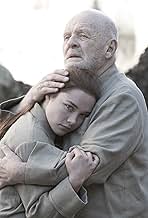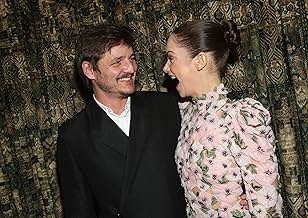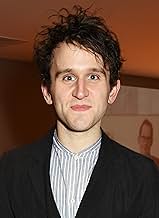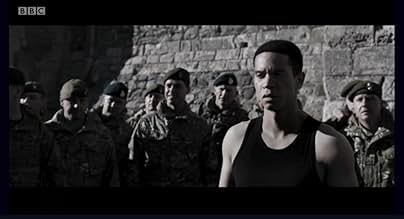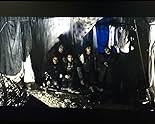VALUTAZIONE IMDb
6,2/10
4635
LA TUA VALUTAZIONE
Un re invecchiando invoca il disastro quando abdica alle sue figlie corrotte e adulatrici mentre rifiuta la sua figlia onesta e amorevole.Un re invecchiando invoca il disastro quando abdica alle sue figlie corrotte e adulatrici mentre rifiuta la sua figlia onesta e amorevole.Un re invecchiando invoca il disastro quando abdica alle sue figlie corrotte e adulatrici mentre rifiuta la sua figlia onesta e amorevole.
- Regia
- Sceneggiatura
- Star
- Candidato a 1 Primetime Emmy
- 1 vittoria e 17 candidature totali
Riepilogo
Reviewers say 'King Lear' (2018) is lauded for its exceptional cast, especially Anthony Hopkins, Emma Thompson, and Emily Watson, and its modern setting that revitalizes Shakespeare's text. However, Hopkins's performance is criticized as one-note, and the film's heavy abridgement is faulted for losing crucial scenes and character depth. The modern setting is seen as both innovative and gimmicky, impacting the original context. Despite these issues, the adaptation is considered visually striking and emotionally resonant.
Recensioni in evidenza
Thought the concept of a modern day (fictional location) for a Shakespeare was a great thing. Been wanting to find some time to watch this as I have always been interested in Shakespeare and never seem to have the time to sit down and dig thru one of his plays and learn to grasp that style of language. So as you can guess this movie was a bit hard for me to follow as a result of a lack of emersion in old English as a language. I was able to follow along fairly well I think and fully understand the tragedy of this work. I quite enjoyed it and thought it well done.
Anthony Hopkins deserves his King Lear. The film is a good proof. And only problem about the new version of play could be only the expectation of the viewer. Maybe, too high. Because it is a beautiful film and it is not a real surprise . Impecable performances, seductive use of modern ingredients, political correctness. And the feeling to discover a sort of version of Titus Andronicus. Something is missing in the performance of Sir Hopkins. It is a correct Lear but nothing more. Like a well known lesson presented front to the class. A sort of sketch using familiar, for public, skills. After its end, not exactly The King Lear remains in memory but an admirable Regan, a precise Earl of Kent, a fine Goneril, an inspired Cordelia. King Lear is more a reflection of the other characters. So, a beautiful version. But one in the shadow of the others.
Most Shakespeare plays have been set in modern times by now, so the idea is far from revolutionary, but it is done well. The cast is stellar, and the production is focused on them and the original text, instead of the setting, which gives this adaptation a theater feel, which will appeal to most Shakespeare fans.
I only wish more of Shakespeare's work would be interpreted in this creative way .. the production partnership in here by BBC and Amazon and directing by the talented "king Lear" expert Richard Eyre did one spectacular job .. yet .. i still have no idea who came up by this "modernizing" of the Shakespearean work like this .. it shins with originality and thrill.
The madness, tension and stress presented by Anthony Hopkins is indescribable ,, felt like he's on the stage of a theater of his imagination he owned each and every line ... i mean even though i needed English subtitles for the movie just to keep up .. still he was amazing .. the whole cast were .. and what a cast ... The kingdom's finest ... Emma Thompson, Jim Carter, Tobias Menzies and Andrew Scott (Moriarty from Sherlock :D) ..just wow.
The movie might be a hard work ,, but it's worth it if you love classical tragedies of Shakespeare and you're prepared to see it in a new style.
The madness, tension and stress presented by Anthony Hopkins is indescribable ,, felt like he's on the stage of a theater of his imagination he owned each and every line ... i mean even though i needed English subtitles for the movie just to keep up .. still he was amazing .. the whole cast were .. and what a cast ... The kingdom's finest ... Emma Thompson, Jim Carter, Tobias Menzies and Andrew Scott (Moriarty from Sherlock :D) ..just wow.
The movie might be a hard work ,, but it's worth it if you love classical tragedies of Shakespeare and you're prepared to see it in a new style.
The thing about seeing a performance of a part in a play or literary adaptation (or really any acting role) that one comes to regard as "definitive", is that such a performance will have a detrimental effect on one's ability to objectively judge any subsequent performance of that part, as any such performance will necessarily be found wanting. Antony Sher as Richard III in Bill Alexander's 1984 RSC production, Kenneth Branagh as Henry V in his own 1989 film adaptation (Enrico V (1989)), Harris Yulin as Willy Loman in David Esbjornson's 2010 Gate Theatre production of Death of a Salesman, Gillian Anderson as Blanche duBois in Benedict Andrews's 2014 Young Vic production of A Streetcar Named Desire, even something like Christopher Lee as Dracula or Marlon Brando as Kurtz in Apocalypse Now (1979). All definitive.
For me, the definitive Lear is a no brainer - Owen Roe in Selina Cartmell's magisterial 2013 Abbey Theatre production. Roe was very much helped by the extraordinarily ambitious direction of Cartmell. However, irrespective of directorial assistance, the scenes on the heath (the so-called "unactable" portion of King Lear), were unlike anything I've ever seen, as Roe alternates, sentence by sentence (!) between a fairly standard (if brilliantly staged) raging at the heavens, and turning directly to the audience and speaking quietly and calmly, almost emotionlessly. Sentence. By. Sentence. Without breaking the metre of the iambic pentameter verse!! Of course, Cartmell's choice here is obvious; the use of two different styles of delivery serve as a succinct visual/aural metaphor for the inner turmoil of the character, but although it's a thematically simple enough device, it requires a performance of immense control to bring it off.
And then we have Anthony Hopkins in writer/director Richard Eyre's TV adaptation for the BBC. Oh dear.
His performance was never going to touch Roe's masterclass for me, but what's especially disappointing is how little interested he seems in doing anything beyond giving the barest essentials in his interpretation of the part.
Having said that, that Hopkins would appear in any filmic adaptation of Lear at all is unexpected. He has played the part before - over one-hundred performances in David Hare's 1986 National Theatre production; a run which was almost immediately followed by over one-hundred performances in Peter Hall's 1987 production of Antony and Cleopatra. Hopkins had been growing disillusioned with theatre acting for some time, and his success in films such as The Elephant Man (1980) and Il Bounty (1984) served only to expedite his growing dissatisfaction. Disliking the experience of performing Shakespeare over two-hundred times in the course of two years, and feeling burnt out (who can blame him), after Antony finished its run, Hopkins moved to the US to pursue film acting full time. He has often spoken since about just how much he hated those two years, and how much he grew to loathe Shakespeare, particularly Lear. On his commentary track for Julie Taymor's Titus (1999), he points out that as far as he was concerned, he was done with Shakespeare, until Taymor convinced him to appear in the film adaptation of her own 1994 Theatre for a New Audience production. He also stresses that Titus will most likely be the last time in his life he plays Shakespeare (calling the performance his "swan song"). Obviously, he changed his mind (or Eyre changed it for him), but that he would do so with Lear, of all plays, is decidedly unexpected.
So, with that in mind, what exactly is wrong with his performance? How can someone who played the part over one-hundred times possibly give an under par performance? Well, probably because he played the role over one-hundred times. The performance is lethargic, jaded, lazy, as if it's routine, become so familiar that all meaning has evaporated from the text (similar to when you say a word over and over and it starts to sound strange). Hopkins plays Lear as an easy-to-anger man, used to getting his own way, with little time for sentiment, whose grip on reality is becoming increasingly tenuous. Nothing wrong with that - it's a very basic reading of the character, but still nothing inherently wrong with it. The problem is, we've seen Hopkins play this character before, or a variation thereof, in everything from Vento di passioni (1994) to Gli intrighi del potere - Nixon (1995) to Wolfman (2010). Indeed, his performances in Eyre's Lear is, beat for beat, a virtual carbon copy of his performance in Taymor's Titus. There are many similarities between the characters, to be sure, but not so many that the parts should be played in exactly the same way (as a contrast, look at Brian Cox's performance in the two roles; Titus in Deborah Warner's ground-breaking 1987 RSC production, and Lear in Warner's 1990 National Theatre production - three years, and an ocean of interpretive difference separate the performances).
Hopkins's performance has two gears - scenery chewing and shouty scenery chewing. That's it. Compare the lack of pathos, emotion, or nuance in his performance to, for example, Cox, Paul Scofield (in Peter Brook's 1971 film - Re Lear (1970)), Jüri Järvet (in Grigoriy Kozintsev's 1971 film - Re Lear (1970)), Laurence Olivier (in Michael Elliott's 1983 TV movie for ITV - Re Lear (1983)), or Anthony Sher (in Gregory Doran's 2018 RSC production). All of them show more range, and a wider and more complete understanding of the text than Hopkins's one note performance. Also, his tendency to pause in the middle of verse lines is extremely distracting, and completely disrupts the meter. Such pauses serve to create artificial caesuras in the iambic pentameter lines, turning the verse into a bizarre amalgamation of anapaestic and dactylic hexameters, and even heptameters. A stronger director would have stamped this out, or had the actor speak in prose (as a few of the other actors do), but to have the actor speak in verse, but show no respect for the verse is...strange.
Thankfully the rest of the cast are universally strong. And what a cast! Emma Thompson as an especially nasty Goneril; Jim Broadbent as a deeply sympathetic Gloucester; John Macmillan as a soft-spoken Edmund; Andrew Scott as a highly emotional Edgar; Jim Carter as a gruff Kent; soon-to-be-superstar Florence Pugh as a very young and wide-eyed Cordelia; Karl Johnson as a decidedly serious Fool; Christopher Eccleston as a suitably ridiculous Oswald; Anthony Calf as a take-charge Albany; and Chukwudi Iwuji as a considerate France. However, the film is stolen by the work of Emily Watson and Tobias Menzies as an insanely bloodthirsty Regan and Cornwall. Watson's Regan oozes raw sexuality, and the (very graphic) blinding scene clearly turns both of them on. Two terrific performances which left me wishing there was more of them together in the play.
Also impressive is Eyre's direction, although the lack of editing rhythm in the opening scene is a little strange, and the shot composition in places tends to flatten the image, making it seem a little like a filmed play. His decision to set the play in modern London, however, with Lear as a retiring pseudo-dictator, works very well (Edgar is an astrophysicist, Edmund is in the armed forces). In this context, the shopping mall scene is especially well conceived and executed, as a now quite mad Lear wanders around a near-derelict shopping mall in a bad part of town, dressed like a vagrant, pushing a shopping trolley, and talking to a doll. It's a deeply unsettling image that encapsulates perfectly just how far he has fallen. Also well conceived is the scene set in an asylum seekers' refugee camp. The political commentary is a little on the nose, as Lear looks around the camp at the faces of the refugees, forcing him to consider issues of which he's never before conceived, but it's effective, timely and non-intrusive.
So, all-in-all, a strong adaptation with an excellent cast brought down only by a weak central performance. Unfortunately, the part of Lear is so completely central, pivotal, and dominating, that if it doesn't work, there's a problem. Hopkins's performance isn't so bad as to distract too much from the excellent work done elsewhere in the piece, but what's annoying about it is it could easily have been so much better. Mind you, members of the cast have been active on Twitter and the interview circuit for the last couple of weeks talking about how much they loved working with Hopkins, and how tremendous they think he is in the role (oftentimes, going to the set even when they weren't working, just to watch him filming). So, what do I know?
For me, the definitive Lear is a no brainer - Owen Roe in Selina Cartmell's magisterial 2013 Abbey Theatre production. Roe was very much helped by the extraordinarily ambitious direction of Cartmell. However, irrespective of directorial assistance, the scenes on the heath (the so-called "unactable" portion of King Lear), were unlike anything I've ever seen, as Roe alternates, sentence by sentence (!) between a fairly standard (if brilliantly staged) raging at the heavens, and turning directly to the audience and speaking quietly and calmly, almost emotionlessly. Sentence. By. Sentence. Without breaking the metre of the iambic pentameter verse!! Of course, Cartmell's choice here is obvious; the use of two different styles of delivery serve as a succinct visual/aural metaphor for the inner turmoil of the character, but although it's a thematically simple enough device, it requires a performance of immense control to bring it off.
And then we have Anthony Hopkins in writer/director Richard Eyre's TV adaptation for the BBC. Oh dear.
His performance was never going to touch Roe's masterclass for me, but what's especially disappointing is how little interested he seems in doing anything beyond giving the barest essentials in his interpretation of the part.
Having said that, that Hopkins would appear in any filmic adaptation of Lear at all is unexpected. He has played the part before - over one-hundred performances in David Hare's 1986 National Theatre production; a run which was almost immediately followed by over one-hundred performances in Peter Hall's 1987 production of Antony and Cleopatra. Hopkins had been growing disillusioned with theatre acting for some time, and his success in films such as The Elephant Man (1980) and Il Bounty (1984) served only to expedite his growing dissatisfaction. Disliking the experience of performing Shakespeare over two-hundred times in the course of two years, and feeling burnt out (who can blame him), after Antony finished its run, Hopkins moved to the US to pursue film acting full time. He has often spoken since about just how much he hated those two years, and how much he grew to loathe Shakespeare, particularly Lear. On his commentary track for Julie Taymor's Titus (1999), he points out that as far as he was concerned, he was done with Shakespeare, until Taymor convinced him to appear in the film adaptation of her own 1994 Theatre for a New Audience production. He also stresses that Titus will most likely be the last time in his life he plays Shakespeare (calling the performance his "swan song"). Obviously, he changed his mind (or Eyre changed it for him), but that he would do so with Lear, of all plays, is decidedly unexpected.
So, with that in mind, what exactly is wrong with his performance? How can someone who played the part over one-hundred times possibly give an under par performance? Well, probably because he played the role over one-hundred times. The performance is lethargic, jaded, lazy, as if it's routine, become so familiar that all meaning has evaporated from the text (similar to when you say a word over and over and it starts to sound strange). Hopkins plays Lear as an easy-to-anger man, used to getting his own way, with little time for sentiment, whose grip on reality is becoming increasingly tenuous. Nothing wrong with that - it's a very basic reading of the character, but still nothing inherently wrong with it. The problem is, we've seen Hopkins play this character before, or a variation thereof, in everything from Vento di passioni (1994) to Gli intrighi del potere - Nixon (1995) to Wolfman (2010). Indeed, his performances in Eyre's Lear is, beat for beat, a virtual carbon copy of his performance in Taymor's Titus. There are many similarities between the characters, to be sure, but not so many that the parts should be played in exactly the same way (as a contrast, look at Brian Cox's performance in the two roles; Titus in Deborah Warner's ground-breaking 1987 RSC production, and Lear in Warner's 1990 National Theatre production - three years, and an ocean of interpretive difference separate the performances).
Hopkins's performance has two gears - scenery chewing and shouty scenery chewing. That's it. Compare the lack of pathos, emotion, or nuance in his performance to, for example, Cox, Paul Scofield (in Peter Brook's 1971 film - Re Lear (1970)), Jüri Järvet (in Grigoriy Kozintsev's 1971 film - Re Lear (1970)), Laurence Olivier (in Michael Elliott's 1983 TV movie for ITV - Re Lear (1983)), or Anthony Sher (in Gregory Doran's 2018 RSC production). All of them show more range, and a wider and more complete understanding of the text than Hopkins's one note performance. Also, his tendency to pause in the middle of verse lines is extremely distracting, and completely disrupts the meter. Such pauses serve to create artificial caesuras in the iambic pentameter lines, turning the verse into a bizarre amalgamation of anapaestic and dactylic hexameters, and even heptameters. A stronger director would have stamped this out, or had the actor speak in prose (as a few of the other actors do), but to have the actor speak in verse, but show no respect for the verse is...strange.
Thankfully the rest of the cast are universally strong. And what a cast! Emma Thompson as an especially nasty Goneril; Jim Broadbent as a deeply sympathetic Gloucester; John Macmillan as a soft-spoken Edmund; Andrew Scott as a highly emotional Edgar; Jim Carter as a gruff Kent; soon-to-be-superstar Florence Pugh as a very young and wide-eyed Cordelia; Karl Johnson as a decidedly serious Fool; Christopher Eccleston as a suitably ridiculous Oswald; Anthony Calf as a take-charge Albany; and Chukwudi Iwuji as a considerate France. However, the film is stolen by the work of Emily Watson and Tobias Menzies as an insanely bloodthirsty Regan and Cornwall. Watson's Regan oozes raw sexuality, and the (very graphic) blinding scene clearly turns both of them on. Two terrific performances which left me wishing there was more of them together in the play.
Also impressive is Eyre's direction, although the lack of editing rhythm in the opening scene is a little strange, and the shot composition in places tends to flatten the image, making it seem a little like a filmed play. His decision to set the play in modern London, however, with Lear as a retiring pseudo-dictator, works very well (Edgar is an astrophysicist, Edmund is in the armed forces). In this context, the shopping mall scene is especially well conceived and executed, as a now quite mad Lear wanders around a near-derelict shopping mall in a bad part of town, dressed like a vagrant, pushing a shopping trolley, and talking to a doll. It's a deeply unsettling image that encapsulates perfectly just how far he has fallen. Also well conceived is the scene set in an asylum seekers' refugee camp. The political commentary is a little on the nose, as Lear looks around the camp at the faces of the refugees, forcing him to consider issues of which he's never before conceived, but it's effective, timely and non-intrusive.
So, all-in-all, a strong adaptation with an excellent cast brought down only by a weak central performance. Unfortunately, the part of Lear is so completely central, pivotal, and dominating, that if it doesn't work, there's a problem. Hopkins's performance isn't so bad as to distract too much from the excellent work done elsewhere in the piece, but what's annoying about it is it could easily have been so much better. Mind you, members of the cast have been active on Twitter and the interview circuit for the last couple of weeks talking about how much they loved working with Hopkins, and how tremendous they think he is in the role (oftentimes, going to the set even when they weren't working, just to watch him filming). So, what do I know?
Lo sapevi?
- QuizAt one point, Sir Anthony Hopkins tried to adapt the play into a movie and intended to star as King Lear. Naomi Watts was cast as Goneril, Gwyneth Paltrow as Regan, and Keira Knightley as Cordelia, but the project never got off the ground and was eventually cancelled.
- ConnessioniFeatured in The 71st Primetime Emmy Awards (2019)
I più visti
Accedi per valutare e creare un elenco di titoli salvati per ottenere consigli personalizzati
Dettagli
- Data di uscita
- Paesi di origine
- Sito ufficiale
- Lingue
- Celebre anche come
- William Shakespeare's King Lear
- Luoghi delle riprese
- Aziende produttrici
- Vedi altri crediti dell’azienda su IMDbPro
Contribuisci a questa pagina
Suggerisci una modifica o aggiungi i contenuti mancanti



